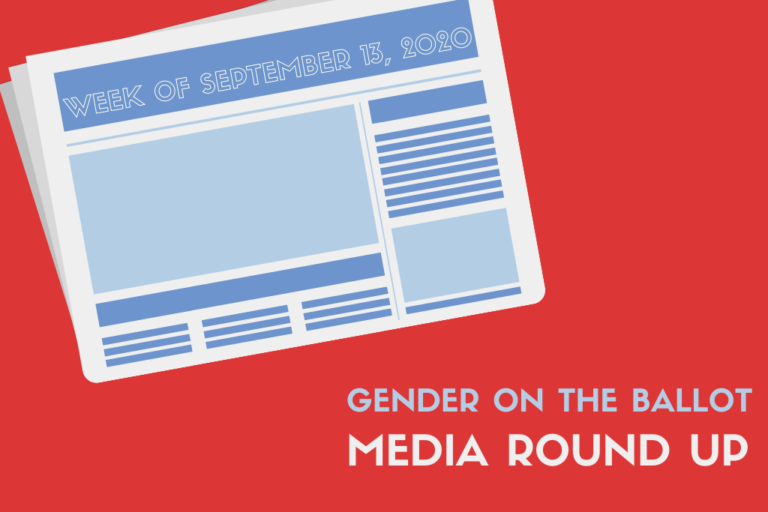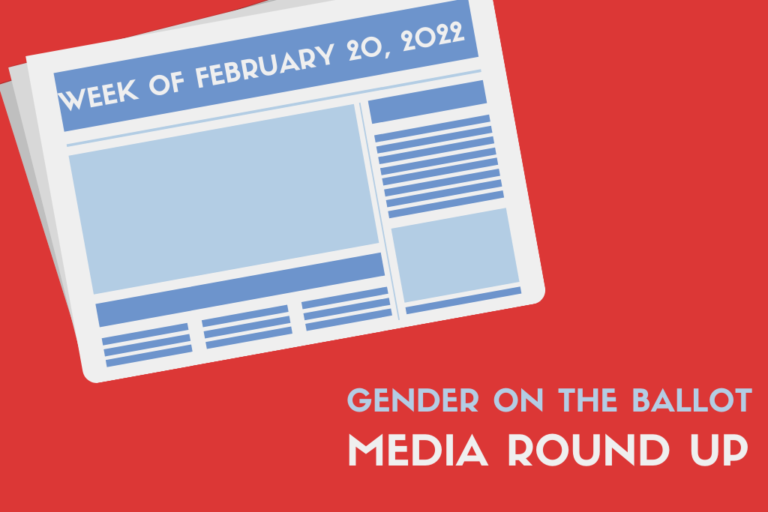Happy Friday! Welcome to our Media Round Up. Each week we’re collecting and sharing our…
Media Round-Up: Week of September 20th

Happy Friday! Welcome to our Media Round Up. Each week we’re collecting and sharing our favorite gender + politics stories. Here’s what caught our eye this week:
These women could make history in November’s midterms
Caroline Vakil, The Hill
This November could be a historic midterm election for women candidates. Voters in the midterm elections could elect the first Gen Z female candidate to Congress, the first Black woman Governor, and the first female in Congress from some states, to name a few of the potential firsts. While some experts regard this as an exciting time in US politics, these potential milestones are a reminder of the continued barriers women face in achieving higher office, including race, sexuality, and age, as well as other aspects of their identity.
Read the full story here.
The end of Roe could be changing people’s minds about abortion bans
Shefali Luthra, The 19th*
For the first time in years, public opinion on abortion may have shifted due to the overturning of Roe v. Wade in June. For decades, polling on abortion has been relatively static with about 60 percent of Americans supporting the right to an abortion in the first trimester of pregnancy, with a lower percentage of people supporting abortions in the second trimester. The public’s opinion on second trimester abortions has been the basis for how some Republicans have framed laws that would ban abortion after 15 weeks of pregnancy. However, there has been sharp backlash to some proposed abortion laws, suggesting that Americans may be less likely to approve banning abortion in the second trimester.
Read the full story here.
The closest Senate race in America that nobody’s watching
Lucille Sherman, Axios
Just a little under two months out from election day, North Carolina’s U.S. Senate race is the most competitive in the country. While outside groups and national parties are focusing their energy on prioritizing states like Georgia and Pennsylvania, North Carolina has the potential to quietly determine the balance of power in the Senate. Democrat Cheri Beasley and Republican Ted Budd are both vying to replace retiring U.S. Senator Richard Burr. If Beasley wins, she will be the first Black woman Senator from North Carolina.
Read the full story here.
For the first time in 230 years, Congress has full U.S. Indigenous representation
Jaclyn Diaz, NPR
Last week, Mary Peltola became a member of the U.S. House representing Alaska’s At-Large Congressional District. Representative Peltola made history as the first Alaska Native to be sworn into Congress. History was also made when Rep. Peltola was sworn in because for the first time in more than 230 years, a Native American, an Alaska Native, and a Native Hawaiian are all members of the House, fully representing the United States’ Indigenous people. There are now six Indigenous Americans who are representatives in the House.
Read the full story here.
The U.S. Has Never Had More than 9 Female Governors at a Time — That Can Change in November
Amy Eskind, People Magazine
Currently there are nine women governors in the United States, the highest number of women governors in office at one time, with eight of them running for reelection in the fall. This election cycle has five gubernatorial races where female nominees are running against other women, a record, which will guarantee at least five woman governors after the midterms in November. And according to Debbie Walsh, director of the Center for American Women and Politics at Rutgers University (CAWP), an additional half-dozen women are favored to win their gubernatorial races against men.
Read the full story here.







